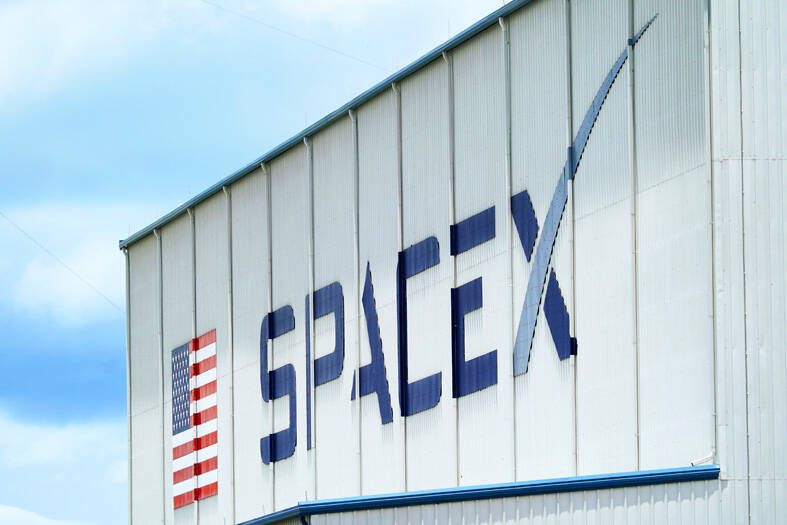The Ministry of Economic Affairs (MOEA) yesterday disputed reports that suppliers to US-based Space Exploration Technologies Corp (SpaceX) had been asked to move production out of Taiwan.
Reuters had reported on Tuesday last week that Elon Musk-owned SpaceX had asked their manufacturers to produce outside of Taiwan given geopolitical risks and that at least one Taiwanese supplier had been pushed to relocate production to Vietnam.
SpaceX’s requests place a renewed focus on the contentious relationship Musk has had with Taiwan, especially after he said last year that Taiwan is an “integral part” of China, sparking sharp criticism from Taiwanese authorities.

Photo: David J. Phillip, AP
The ministry said that it had contacted the Taiwanese suppliers cited in the Reuters report and found that none of them had received such a request from SpaceX.
The suppliers provide services to global clients and often adjust their production to meet clients’ needs, but so far they have not been asked to move their production overseas, the ministry added.
“Taiwan is capable of developing its own ground station equipment for satellite reception, and its manufacturers are highly competitive,” the ministry said.
“The ministry is not aware of any production relocation of these firms [and] has faith that any short-term political factors would not affect their ties with international satellite companies,” it added.
Faced with growing trade tensions between the US and China, escalating geopolitical unease and a global trend of economically decoupling with China, many Taiwanese suppliers have diversified their production in the global market and have become highly flexible in dealing with changes, the ministry said.
Forty-six Taiwanese component makers have entered the global satellite supply chain, covering a wide range of products, such as raw material components, printed circuit boards, wires, cables and power management solutions, it said.
Taiwanese suppliers who can develop high, medium and low Earth orbit satellite services also cater to international clients, including telecom operators and satellite equipment suppliers, the ministry added.
The electronics and information communication industries, the semiconductor business in particular, have become an indispensable part of the global supplier chain, the ministry said.
While the local electronic component industry has continued to increase production and upgrade technologies on its own to lay a good foundation for the satellite business, the government has since 2021 also assisted about 30 companies in developing ground station equipment to build robust connections with the global supply chain, the ministry said.

When an apartment comes up for rent in Germany’s big cities, hundreds of prospective tenants often queue down the street to view it, but the acute shortage of affordable housing is getting scant attention ahead of today’s snap general election. “Housing is one of the main problems for people, but nobody talks about it, nobody takes it seriously,” said Andreas Ibel, president of Build Europe, an association representing housing developers. Migration and the sluggish economy top the list of voters’ concerns, but analysts say housing policy fails to break through as returns on investment take time to register, making the

‘SILVER LINING’: Although the news caused TSMC to fall on the local market, an analyst said that as tariffs are not set to go into effect until April, there is still time for negotiations US President Donald Trump on Tuesday said that he would likely impose tariffs on semiconductor, automobile and pharmaceutical imports of about 25 percent, with an announcement coming as soon as April 2 in a move that would represent a dramatic widening of the US leader’s trade war. “I probably will tell you that on April 2, but it’ll be in the neighborhood of 25 percent,” Trump told reporters at his Mar-a-Lago club when asked about his plan for auto tariffs. Asked about similar levies on pharmaceutical drugs and semiconductors, the president said that “it’ll be 25 percent and higher, and it’ll

CHIP BOOM: Revenue for the semiconductor industry is set to reach US$1 trillion by 2032, opening up opportunities for the chip pacakging and testing company, it said ASE Technology Holding Co (日月光投控), the world’s largest provider of outsourced semiconductor assembly and test (OSAT) services, yesterday launched a new advanced manufacturing facility in Penang, Malaysia, aiming to meet growing demand for emerging technologies such as generative artificial intelligence (AI) applications. The US$300 million facility is a critical step in expanding ASE’s global footprint, offering an alternative for customers from the US, Europe, Japan, South Korea and China to assemble and test chips outside of Taiwan amid efforts to diversify supply chains. The plant, the company’s fifth in Malaysia, is part of a strategic expansion plan that would more than triple

Taiwanese artificial intelligence (AI) server makers are expected to make major investments in Texas in May after US President Donald Trump’s first 100 days in office and amid his rising tariff threats, Taiwan Electrical and Electronic Manufacturers’ Association (TEEMA, 台灣電子電機公會) chairman Richard Lee (李詩欽) said yesterday. The association led a delegation of seven AI server manufacturers to Washington, as well as the US states of California, Texas and New Mexico, to discuss land and tax issues, as Taiwanese firms speed up their production plans in the US with many of them seeing Texas as their top option for investment, Lee said. The